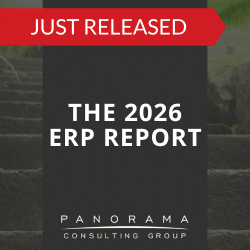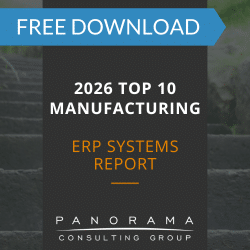If you’ve been working with legacy systems for years, it may be time to implement a centralized platform that can improve productivity and add visibility to your operations.
For many manufacturers, the answer lies in enterprise resource planning (ERP) software. However, some manufacturers may benefit more from material requirements planning (MRP) software.
Today, we’re breaking down the ERP vs MRP conundrum to help you decide what’s best for your company.
What is An MRP System?
An MRP system is a type of enterprise software that focuses solely on the manufacturing side of a business.
Unlike ERP, which encompasses a range of core business functions, MRP is narrower in scope. With this system, users have complete control of:
- Stock management
- Purchasing and manufacturing
- Works in progress
- Overall equipment effectiveness (OEE)
Manufacturers can use MRP to effectively manage every aspect of their production planning. With the data insights the system generates, they can conduct more accurate forecasting and order materials in appropriate volumes.
They can also optimize scheduling to ensure those volumes arrive on their intended date.
Robust MRP systems contain APIs that allow users to integrate their system with their suppliers’ databases. With this integration, total supply chain management becomes possible.
2025 Top 10 Manufacturing ERP Systems Report
Are you a mid- to large-sized manufacturing firm? This report is for you. Download it now to learn what kind of advanced functionality is available in the market today.
What is ERP?
Like MRP, ERP software is meant to centralize and organize business activity. However, it has a more general focus than MRP.
With an ERP system, business leaders can automate and unify their critical business activities into one single database, accessible by all end-users. As a result, organizations can use cross-departmental insights to help unlock process improvements and drive digital transformation.
A few of the functions you might find in an ERP system include:
- Accounting
- Manufacturing
- Sales
- Marketing
- Supply chain
- Human resources
Understanding The Differences in Both ERP and MRP Systems Can Bring Major Business Benefits
Not only can these systems improve visibility, but they can ensure on-time deliveries and provide insight into day-to-day activities on the shop floor. Without such controls in place, team performance can lag, along with profitability.
With ERP, companies can automate many of their in-house tasks, from accounting to HR. While many ERP systems also include robust supply chain functions, companies with a strict manufacturing focus can find MRP systems designed specifically for their niche.
ERP vs MRP: Which Should You Implement?
Deciding to pursue an MRP or ERP implementation is a major step, and you want to make sure you’re moving in the right direction.
That said, is an MRP system right for you, or should you begin the process of ERP selection, instead?
If you’re on the fence, it helps to know a few key differences between the two types of software. Here’s what you can expect from each one.
Broad-Based Support: ERP
If you’re looking for broad support of your entire supply chain, an ERP system is the best move. With this software, you’ll enable information sharing across your enterprise, allowing for a cohesive view of how each department is functioning.
For many companies, manufacturing is an integral part of their organization, but they still need help managing the day-to-day administrative tasks that take place outside the warehouse floor.
Business leaders who need manufacturing controls, as well as automation for their financial, sales and marketing functions, could find the all-in-one solution they need in ERP.
Optimized Manufacturing Control: MRP
An MRP system helps you fine-tune your production schedule to operate as efficiently as possible.
Every time your company receives an order, it’s linked directly to your current inventory levels. Then, the system can calculate the exact amount of time required for each production stage to ensure the right products are finished and delivered on schedule.
An MRP system can also help you forecast future availability and customer demand. In today’s world, this kind of agility is key to business survival.
Other Factors to Consider For Your ERP vs. MRP Decision
As you weigh your options, keep in mind that success depends more on your execution than your system decision.
Successful project execution requires success factors, such as organizational change management. While your employees may be fed up with existing pain points, don’t assume that means they’re completely on-board with the new system you’ve selected. The impact of change is significant even for employees who support the concept of implementing a new system.
Another success factor is business process reengineering. You may have outdated, manual workflows that don’t align with your new digital strategy. Instead of holding tight to tradition, you should look for opportunities for improvement and maybe even reconsider your business model.
Transform the Way You do Business and Improve Your Operations
If you need broad, enterprise-wide support that covers your core business functions, then ERP can deliver that comprehensive approach.
On the other hand, if you’re mainly looking to optimize every aspect of your production schedule to meet customer demand and bolster your competitive advantage, then MRP may be the answer.
Our ERP consultants can help you navigate this next step and select the system that’s best for you. Contact us below for a free consultation and let’s get started.













